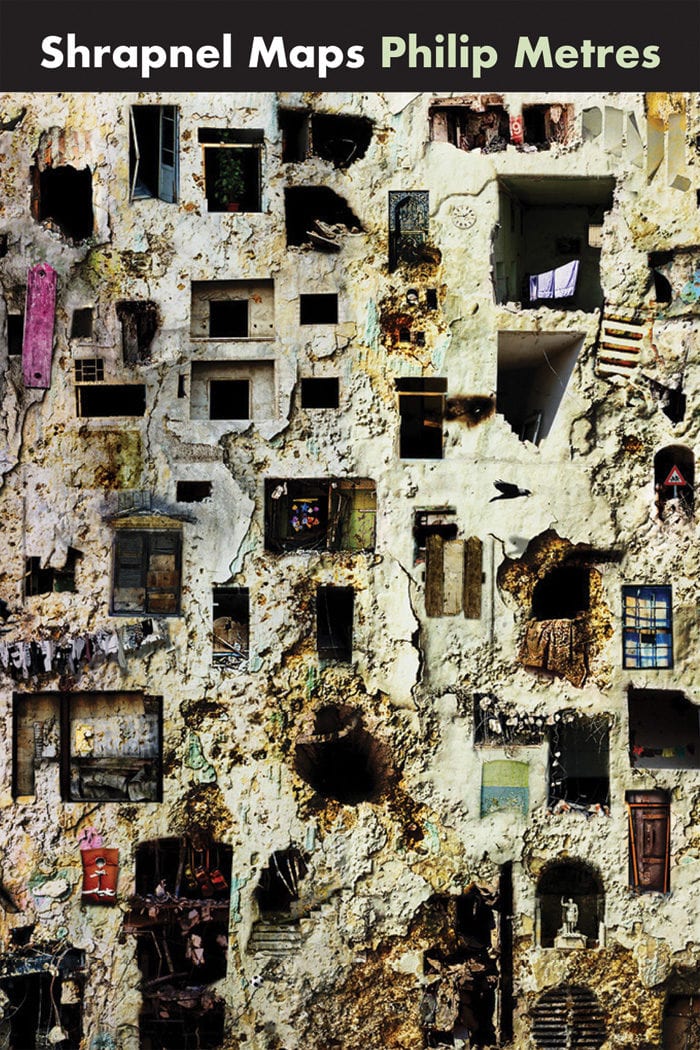
Writing into the wounds and reverberations of the Israel/Palestine conflict, Philip Metres’ fourth book of poems, Shrapnel Maps, is at once elegiac and activist, an exploratory surgery to extract the slivers of cartography through palimpsest and erasure. A wedding in Toura, a suicide bombing in Jerusalem, uneasy interactions between Arab and Jewish neighbors in University Heights, the expulsion of Palestinians in Jaffa, another bombing in Gaza: Shrapnel Maps traces the hurt and tender places, where political noise turns into the voices of Palestinians and Israelis. Working with documentary flyers, vintage postcards, travelogues, cartographic language, and first person testimonies, Shrapnel Maps ranges from monologue sonnets to prose vignettes, polyphonics to blackouts, indices to simultaneities, as Palestinians and Israelis long for justice and peace, for understanding and survival.
ISBN: 9781556595639
Format: Paperback
Reviews
“This is a breathtaking collection, unrivaled in scope or execution, fit to dwell among the great collections of our time… [W]hat sets Shrapnel Maps apart from many of its contemporaries is its insistence on reaching for the light, in reaching for unity, in reaching for new definitions of peace and new definitions of a sustainable joy.” —Cleveland Review of Books
“Metres has emerged as one of the leading Catholic poet-activists. A riveting, ambitious book.” —The Millions
“Drawing language and insight from across [various religious, cultural, and political] archives, the poems in this collection imagine forms of radical listening that seek to uncover that utterance of relational possibility which the official archive buries and renders silent. Brave and challenging, Shrapnel Maps asks hard questions but creates a courageous space in which to have these conversations.” —The Adroit Journal
“The substance behind Shrapnel Maps is substantial and groundbreaking, and poet Philip Metres has created a compelling work within its covers that will bring a new view to everyone who delves into its space.” —New York Journal of Books
“Shrapnel Maps is so beautiful. Half dream, half nightmare, all real. Filled with the remnants of what people hope for and what they are willing to do, and everything that remains afterwards. It’s a confrontation to identity and it dares to conjugate love as a defiance to the capacity of violence. Extraordinary… elegant and devastating and compelling and complex.” —Pádraig Ó Tuama
“These are beautifully made, emotionally difficult poems to read because they insist on the reader’s presence as they take us inside of what, in truth, has become so far, an endless conflict. They visit the tautologies of two histories; inverse claims on the truth of what this conflict is about and push back, as if to open a common space for breathing. They are poems of immense compassion that invite a new way to calculate the future for both Palestine and Israel.” —Miriam O’Neal for Cervena Bara Press
“By alternating between a polyphony of shifting voices, and letting these voices to carry the weight of their histories, we see how the burden of fears harden into bias. It is the hardening, itself, that Metres illuminates and excavates.” —Alina Stefanescu
“Metres writes through, against, and with history and weaves a narrative committed to neighborliness and kinship in shared pain.” —World Literature Today
“The lyrics in Shrapnel Maps do not seethe. Rather, they say their piece while alluding to the other pieces of the puzzle we’re all trying to put together, not knowing the final image. The book ultimately takes a cosmological approach to truth and reconciliation…”—The Baffler
